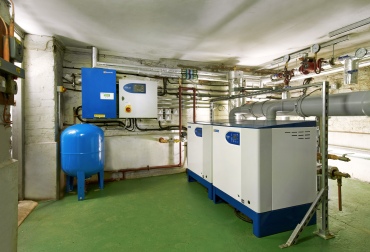Are you in control of your heating costs?

There are many ways in which boilers can save energy and reduce carbon emissions in commercial buildings — especially modular boilers as Stuart Turner of Hamworthy Heating explains.
If we are to continue to burn fossil fuels such as gas, we need to make sure we are doing it as efficiently as possible to reduce wastage of this resource and actually lessen the impact on the environment. Improved efficiency really does affect the bottom line — and saves on carbon.
But what role can boilers play in improving the energy efficiency of a commercial building?
To this end, modular boiler systems present the most efficient choice for commercial buildings. Hamworthy, for example, has supplied modular boilers since the 1960s. The benefits they bring to non-domestic buildings of greater control, flexibility and security as well as reduced system losses are clear to see.
Modular boilers have advantages for installation too, due to their flexible construction and size. Installing smaller modular boilers is physically easier than very large boilers, and ongoing access and handling is not a problem — even in the most compact boiler rooms.
Using multiple boilers increases system security. The building can still be heated sufficiently if a module breaks down, without putting the building at risk.
Plus, for retrofit projects they are often installed alongside the existing boiler, especially when using a wall-hung boiler on a frame which can be bolted to the floor. This helps to ensure a smooth changeover from old to new with little or no system downtime. This makes the modular solution very popular in schools and the health sector.
In the same vein, the servicing of modular boilers is much more convenient, as one module can be serviced whilst the others continue to meet the system demand for heat without the risk of interrupting services.
Another benefit of modular boilers is their ability to closely match the load profile of the building.
It is important that a heating system is designed to match the load requirement as accurately as possible. It needs to deliver the right amount of heat at the right time in the right place, otherwise energy is wasted. Many projects opt for replacing like-for-like equipment without assessing the entire building and system. The heating load could have changed, and the system may require fewer or more boilers. With the Energy related Products (ErP) Directive just around the corner, it will not be possible to replace atmospheric boilers like for like; a condensing boiler will have to be installed.
The use of high-efficiency condensing equipment that is operating in condensing mode (return temperatures need to be less than 55°C for the boiler to actually condense) will significantly reduce fuel usage. Using single or multiple boiler systems with modulating burners allows for closer load matching with resultant improvements in system operating efficiency. Plus, overall emissions will be reduced because the boilers will fire less often.

However, the benefits of newer condensing modular boilers will only ever be maximised if they are set up and controlled correctly. The overall efficiency of multiple boiler plant depends on how closely its total output can be controlled to match the load profile of the building.
A sequence controller installed in a multiple boiler system enables the boilers to be operated in such a way that they modulate together to match the load.
By firing the maximum number of boilers needed to match the load with each operating at or near its minimum modulation, each boiler is operating in its most efficient state (i.e. part-load) — which achieves very high system operating efficiency.
Choosing the right control strategies for multiple boiler plant, for example using unison or cascade operation and the boiler firing order, will depend on the application priorities and the planned maintenance regime.
Splitting the heating system into zones allows for accurate control of different areas of a building. Combine this with weather-compensation controls and the system will be able to provide the most comfortable conditions for the occupants of a building. The flow temperature will be adjusted according to the outside temperatures, enabling boilers to condense whenever suitable system conditions permit.
Today’s controls are more sophisticated today and have extensive functionality, but many people are still not using them to their full capability. A control panel on manual is like throwing £50 notes out of a window for every hour a boiler over one megawatt is running.
The ability to accurately control efficiencies of modular condensing boilers will ensure that these are the most sustainable and economic solution for many years to come. They have a significant role to play in carbon reduction and can produce real energy savings.
We have an example of a hospital that could achieve savings of more than £1.2 million on its gas bills over a 25-year life by opting for smaller-output modular boilers over large-output single boilers. This impressive cost saving comes mainly from the greater control and larger turndown ratios of the modular boiler system. Add to that the corresponding reductions in carbon emissions, and this is quite an attractive proposition for the hospital.
Stuart Turner is national sales manager at Hamworthy Heating.







